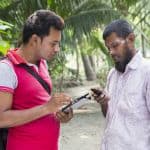Is Universal Financial Access Still Possible?
Can the world achieve universal financial access by 2020? That’s a question on the minds of many who assembled for the IMF/World Bank Spring Meetings in Washington, D.C. last week. For Mastercard and many of our partners, it’s something we think about every day because we know what’s at stake.
Most of us will never know what it’s like to have to travel a full day to receive a benefit check, stand in line for hours just to pay a bill, or have no way to receive and store our money safely. But that’s the reality for more than 1.7 billion people on the planet, according to the latest Global Findex report from the World Bank.
Still, I consider myself to be an optimist and, while we have a lot of work to do, I believe we’re on the right path towards the inclusion of everyone. In fact, the Global Findex shows that 515 million adults have opened accounts since the last report in 2014. That’s good progress. But owning an account is just the first step towards financial inclusion. The real value is in being able to use it in a safe and convenient way.
So, while we’re incredibly proud to have contributed to this progress by connecting more than 300 million people to Mastercard accounts through solutions that digitize government benefits, payroll and other payments, we know that universal financial access must go hand-in-hand with driving usage. That’s when we’ll begin to see the kind of impact that can transform economies and lives.
How do we get there? By focusing on people, products and partnerships.
The underserved are much talked about, but little understood. We have to go to where the people are, understand their world and how our technology fits —or sometimes doesn’t fit— into it. That’s what we did when we embarked on a multi-year journey to understand the lives and attitudes of the underserved, with research being released later this spring that stretches across 16 markets in five different regions. We found that this group is far from monolithic. Their needs vary by geography, community and individual preference. Gaining a better understanding of these individual needs is helping us build global strategies we can scale, while providing locally relevant solutions that will actually get used and impact lives.
These solutions are based on digital technology that is not only driving usage in financial services, but also reducing inequalities – particularly between men and women and the rich and the poor. For example, in Kenya men are 18 percent more likely to have an account, but women are 11 percent more likely to use mobile money, according to the World Bank. Mastercard built a product called 2Kuze that is helping small farmers (43 percent of whom are women) in Kenya, Uganda and Tanzania sell and get paid for their produce via a mobile phone. With 200 million unbanked adults receiving agricultural payments in cash, this represents a huge opportunity for inclusion.
We have also pledged to bring 40 million micro and small businesses onto our network by 2021, because that’s where most of the underserved shop each day. We launched Masterpass QR to make it easier and more affordable for small businesses to accept digital payments and drive usage.
Finally, we know that partnerships are critical to driving scale – and businesses are vital to unlocking opportunities to expand financial inclusion. Global Findex data shows that more than 200 million unbanked adults who work in the private sector are paid in cash only. We can change that, but we can’t do it alone. Partnerships with like-minded companies enable us to build long-term, scalable models that deliver real impact. We’re already doing this with companies like Unilever, Care.com and others to help small business owners, gig workers and garment factory workers grow their businesses and get paid.
Again, I’m optimistic that full financial inclusion is within our reach. Mastercard is already more than half-way to our goal of connecting 500 million new consumers to bank accounts by 2020. By continuing to focus on driving usage of those accounts – through a better understanding of the people we’re serving and the products they need, and innovative partnerships with companies, governments and other organizations – our vision of a world beyond cash will soon become reality.
Daniel Monehin is Executive Vice President, Remittances and Head of Financial Inclusion for Mastercard. He is based in Dubai.
Images courtesy of Mastercard.
- Categories
- Finance, Technology



